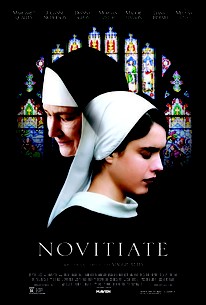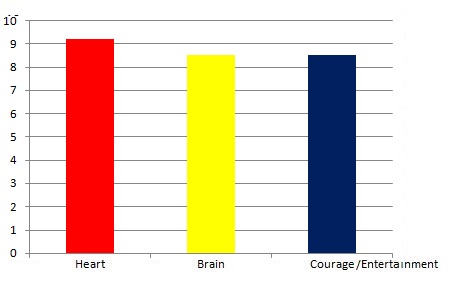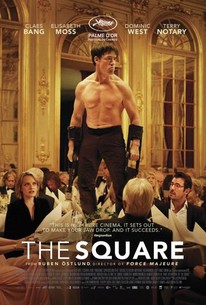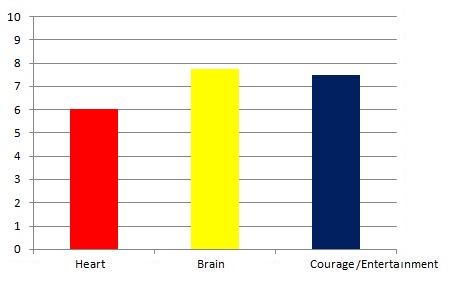
Main Page
Alphabetical Menu
Chronological Menu
|
Novitiate  Cathleen (Margaret Qualley), a 17-
year-old girl who comes from a dysfunctional home, joins a convent in hopes of becoming a nun.
Reverend Mother (Melissa Leo) leads the postulants with her strict rules about how to remain
devoted to God and with her draconian punishments if any of them were to break the rules. Other
postulants who Cathleen meets at the convent include Emily (Liana Liberato), Sister Sissy
(Maddie Hasson), Sister Evelyn (Morgan Saylor), Sister Emanuel (Rebecca Dayan), and Sister Mary
Grace (Dianna Agron). Despite explicit orders from Vatican II which ammend the rules and
prohibit draconian punishments, i.e. self-flagulation, Reverend Mother firmly refuses to change
her ways. However, Cathleen and other postulants experience innate spiritual conflicts that
question their relationship to God as well as to their domineering Reverend Mother. Melissa Leo gives a commanding, tour de force
performance as Reverend Mother. During the first hour, her performance comes a cross as a bit
hammy and over-the-top, but that's no fault of Leo; it's because the screenplay by Margaret
Betts only shows one dimension of her character during that time: the mean side. Betts
gradually strips away Revered Mother's other layers during the second half the film as you
learn where her anger comes from and observe some fragility and insecurity lurking beneath the
surface. Through flashbacks, you also learn how and why Cathleen ended up in the convent. Margaret Qualley gives a radiant, breakthrough performance as Cathleen. As
usual, Julianne Nicholson gives a strong performance as Cathleen's single mother, Nora, who's
worried about the way that her daughter is being mistreated at the convent. Her confrontation
with Reverend Mother is one of the film's most captivating scenes. The same can be said of the
scene where Archbishop McCarthy sits down with Reverend Mother to get to the bottom of why
she's been ignoring the letters from the Vatican about the more relaxed rule changes. She
clearly remains too power-hungry and egotistical to allow for any changes that would reduce the
nun's power. It's quite heartbreaking to watch as she emotionally and psychologically abuses
the convent's postulants and even allows them to undergo physical abuse. Don't be surprised if
you'll hate Reverend Mother during those moments. Fortunately, Novitiate becomes increasingly nuanced and profound as it explores the inner struggles of the young women under Reverend Mother's control. They each go through their own mental suffering and obstacles, i.e. a sexual identity and spiritual crisis. The tender screenplay by Margaret Betts explores the characters' struggles in a very organic and deeply human way without turning any of them into caricatures. Even Reverend Mother isn't quite the villain that you might have considered her at the beginning; she's also a complex human being who has yet to overcome her innate struggles. The film's humanism and how it tackles complexities of human emotions help it to rise above mediocrity and to become a provocative, emotionally resonant, and powerful drama.  The Square  Christian (Claes Bang), a curator at a
contemporary art museum in Sweden, introduces to a the public a new installation called "The
Square," a space where people who enter it are supposed to be treated equally and must show
compassion and respect for others. It's somewhere that people can, ideally, feel safe at while
not crossing moral or ethical boundaries. The ads used to publicise the installation don't
quite go as planned. Also, someone robs Christian, and he puts note under everyone's door at an
apartment building accusing them of being the robber. One of the residents, a young boy, gets
into trouble with his parents after Christian falsely accuses him of being the robber.
Meanwhile, he has a sexually-charged affair with a reporter, Anne (Elizabeth Moss). Bold, bizarre, and outrageously funny, The Square
makes a very provocative, perceptive and bleak critique of mankind's decay along with its
selfishness and shallowness. However, the screenplay by writer/director Ruben Ístlund gets
repetitive, though, after a while, while hammering its messages over and over and over. The
message behind Christian's instillation is quite clear from the get-go, so to have it repeated
so often makes it seem like the filmmaker doesn't trust the audience's intelligence enough. At
least he trusts the audience's patience, though. Tighter editing would have allowed to film to
flow without dragging; some scenes feel too much like filler. A dinner scene
with a very off-the-wall interruption goes on for too long, for instance, while belaboring its
point.
The satirical scenes, though, are quite
quite captivating because of the ways that Ístlund uses humor to shed light on harsh truths
about humanity. When an artist (Dominic West) is interviewed on stage in front of an audience,
an audience member with Tourette Syndrome continuously yells out obscenities like "Show us your
tits!" which results in laughter, but that leads us to question ourselves whether or not we
really ought to be laughing at someone suffering from a mental disorder instead of showing
compassion. It's an awkward, guilty sort of laughter even though comedy does often derive from
tragedy. There are a few other instances of similarly uncomfortable humor throughout the film.
At near 2-and-a-half hours, The Square is just as inspired and unpredictable as last year's Toni Erdmann. Both films have a long running time, a slow pace, deceptively simple plot, a hilarious yet awkward scene involving someone behaving like an animal, and a funny bit involving semen. Did I mention two brief scenes showing an ape with lipstick on? You'll have to see it to believe it.  Main Page Alphabetical Menu Chronological Menu ______________________________________________________ |
The NYC Movie Guru
themovieguru101@yahoo.com
Privacy Policy